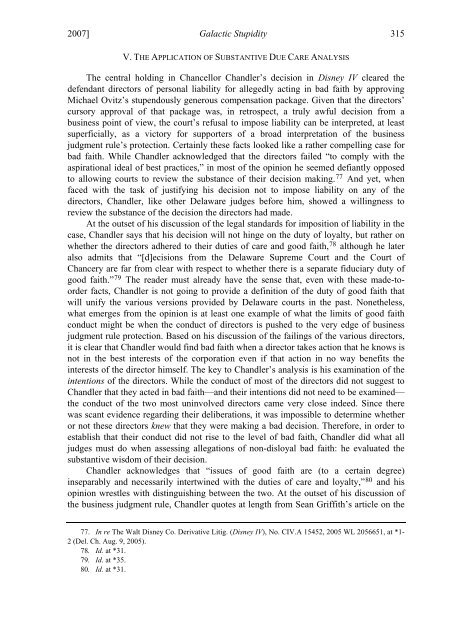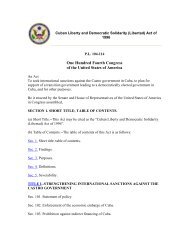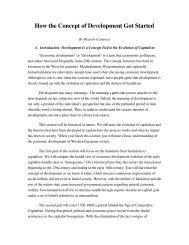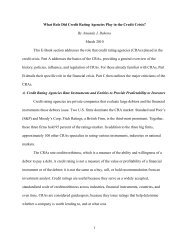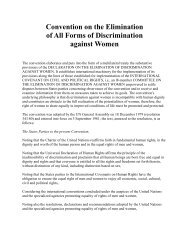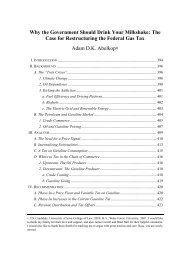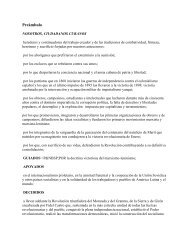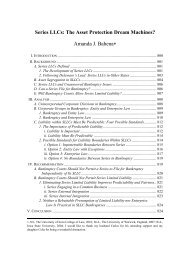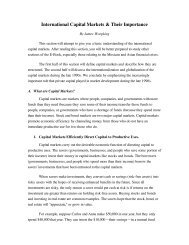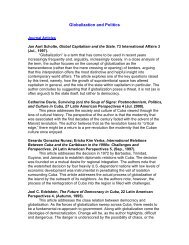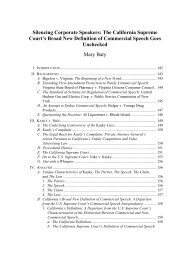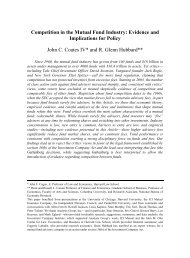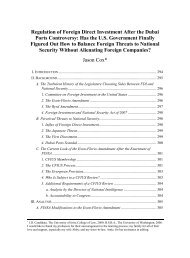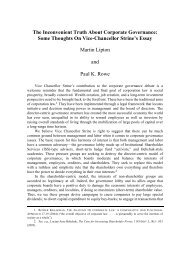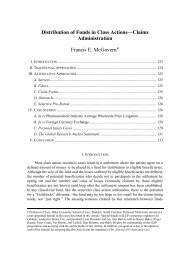Galactic Stupidity and the Business Judgment Rule - College of Law
Galactic Stupidity and the Business Judgment Rule - College of Law
Galactic Stupidity and the Business Judgment Rule - College of Law
You also want an ePaper? Increase the reach of your titles
YUMPU automatically turns print PDFs into web optimized ePapers that Google loves.
2007] <strong>Galactic</strong> <strong>Stupidity</strong> 315<br />
V. THE APPLICATION OF SUBSTANTIVE DUE CARE ANALYSIS<br />
The central holding in Chancellor Ch<strong>and</strong>ler’s decision in Disney IV cleared <strong>the</strong><br />
defendant directors <strong>of</strong> personal liability for allegedly acting in bad faith by approving<br />
Michael Ovitz’s stupendously generous compensation package. Given that <strong>the</strong> directors’<br />
cursory approval <strong>of</strong> that package was, in retrospect, a truly awful decision from a<br />
business point <strong>of</strong> view, <strong>the</strong> court’s refusal to impose liability can be interpreted, at least<br />
superficially, as a victory for supporters <strong>of</strong> a broad interpretation <strong>of</strong> <strong>the</strong> business<br />
judgment rule’s protection. Certainly <strong>the</strong>se facts looked like a ra<strong>the</strong>r compelling case for<br />
bad faith. While Ch<strong>and</strong>ler acknowledged that <strong>the</strong> directors failed “to comply with <strong>the</strong><br />
aspirational ideal <strong>of</strong> best practices,” in most <strong>of</strong> <strong>the</strong> opinion he seemed defiantly opposed<br />
to allowing courts to review <strong>the</strong> substance <strong>of</strong> <strong>the</strong>ir decision making. 77 And yet, when<br />
faced with <strong>the</strong> task <strong>of</strong> justifying his decision not to impose liability on any <strong>of</strong> <strong>the</strong><br />
directors, Ch<strong>and</strong>ler, like o<strong>the</strong>r Delaware judges before him, showed a willingness to<br />
review <strong>the</strong> substance <strong>of</strong> <strong>the</strong> decision <strong>the</strong> directors had made.<br />
At <strong>the</strong> outset <strong>of</strong> his discussion <strong>of</strong> <strong>the</strong> legal st<strong>and</strong>ards for imposition <strong>of</strong> liability in <strong>the</strong><br />
case, Ch<strong>and</strong>ler says that his decision will not hinge on <strong>the</strong> duty <strong>of</strong> loyalty, but ra<strong>the</strong>r on<br />
whe<strong>the</strong>r <strong>the</strong> directors adhered to <strong>the</strong>ir duties <strong>of</strong> care <strong>and</strong> good faith, 78 although he later<br />
also admits that “[d]ecisions from <strong>the</strong> Delaware Supreme Court <strong>and</strong> <strong>the</strong> Court <strong>of</strong><br />
Chancery are far from clear with respect to whe<strong>the</strong>r <strong>the</strong>re is a separate fiduciary duty <strong>of</strong><br />
good faith.” 79 The reader must already have <strong>the</strong> sense that, even with <strong>the</strong>se made-toorder<br />
facts, Ch<strong>and</strong>ler is not going to provide a definition <strong>of</strong> <strong>the</strong> duty <strong>of</strong> good faith that<br />
will unify <strong>the</strong> various versions provided by Delaware courts in <strong>the</strong> past. None<strong>the</strong>less,<br />
what emerges from <strong>the</strong> opinion is at least one example <strong>of</strong> what <strong>the</strong> limits <strong>of</strong> good faith<br />
conduct might be when <strong>the</strong> conduct <strong>of</strong> directors is pushed to <strong>the</strong> very edge <strong>of</strong> business<br />
judgment rule protection. Based on his discussion <strong>of</strong> <strong>the</strong> failings <strong>of</strong> <strong>the</strong> various directors,<br />
it is clear that Ch<strong>and</strong>ler would find bad faith when a director takes action that he knows is<br />
not in <strong>the</strong> best interests <strong>of</strong> <strong>the</strong> corporation even if that action in no way benefits <strong>the</strong><br />
interests <strong>of</strong> <strong>the</strong> director himself. The key to Ch<strong>and</strong>ler’s analysis is his examination <strong>of</strong> <strong>the</strong><br />
intentions <strong>of</strong> <strong>the</strong> directors. While <strong>the</strong> conduct <strong>of</strong> most <strong>of</strong> <strong>the</strong> directors did not suggest to<br />
Ch<strong>and</strong>ler that <strong>the</strong>y acted in bad faith—<strong>and</strong> <strong>the</strong>ir intentions did not need to be examined—<br />
<strong>the</strong> conduct <strong>of</strong> <strong>the</strong> two most uninvolved directors came very close indeed. Since <strong>the</strong>re<br />
was scant evidence regarding <strong>the</strong>ir deliberations, it was impossible to determine whe<strong>the</strong>r<br />
or not <strong>the</strong>se directors knew that <strong>the</strong>y were making a bad decision. Therefore, in order to<br />
establish that <strong>the</strong>ir conduct did not rise to <strong>the</strong> level <strong>of</strong> bad faith, Ch<strong>and</strong>ler did what all<br />
judges must do when assessing allegations <strong>of</strong> non-disloyal bad faith: he evaluated <strong>the</strong><br />
substantive wisdom <strong>of</strong> <strong>the</strong>ir decision.<br />
Ch<strong>and</strong>ler acknowledges that “issues <strong>of</strong> good faith are (to a certain degree)<br />
inseparably <strong>and</strong> necessarily intertwined with <strong>the</strong> duties <strong>of</strong> care <strong>and</strong> loyalty,” 80 <strong>and</strong> his<br />
opinion wrestles with distinguishing between <strong>the</strong> two. At <strong>the</strong> outset <strong>of</strong> his discussion <strong>of</strong><br />
<strong>the</strong> business judgment rule, Ch<strong>and</strong>ler quotes at length from Sean Griffith’s article on <strong>the</strong><br />
77. In re The Walt Disney Co. Derivative Litig. (Disney IV), No. CIV.A 15452, 2005 WL 2056651, at *1-<br />
2 (Del. Ch. Aug. 9, 2005).<br />
78. Id. at *31.<br />
79. Id. at *35.<br />
80. Id. at *31.


